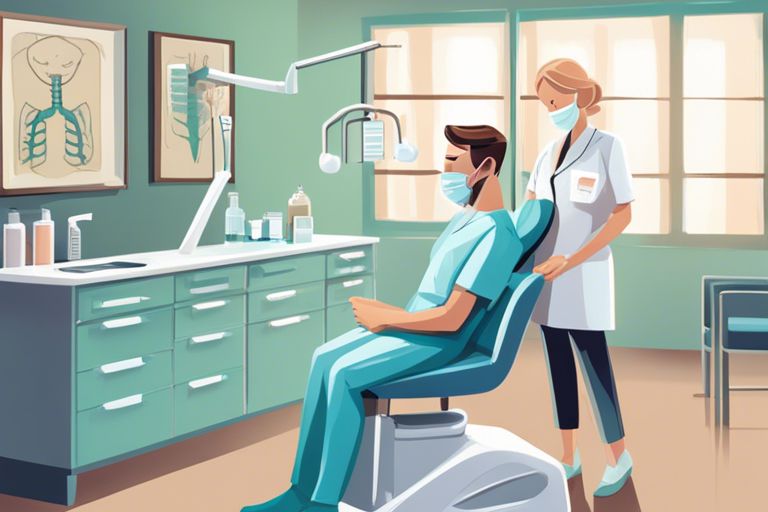Many individuals with neurological conditions face unique challenges when it comes to maintaining good oral health. Conditions such as Parkinson’s disease, Alzheimer’s disease, and multiple sclerosis can impact a person’s ability to perform daily oral care tasks, leading to an increased risk of dental issues. In a study on the barriers to and facilitators of oral health among persons with mental illness and developmental disabilities, researchers found that individuals with neurological conditions often face barriers such as limited access to dental care and difficulty with oral hygiene practices. It is crucial for healthcare providers to be aware of these challenges and work with patients to develop tailored strategies to improve oral health outcomes.
Common Oral Health Challenges in Neurological Conditions
A common feature among individuals with neurological conditions is the manifestation of various oral health challenges. These challenges can range from difficulties with swallowing to complications in maintaining proper oral hygiene. Understanding and addressing these issues are crucial in providing comprehensive care for individuals with neurological conditions.
Dysphagia and its Implications for Oral Health
One of the primary challenges faced by individuals with neurological conditions is dysphagia, a condition that affects swallowing function. Dysphagia can lead to difficulties in chewing, swallowing, and overall oral intake. As a result, individuals may experience oral hygiene issues such as accumulation of food debris in the mouth, which can increase the risk of dental decay and gum disease.
Furthermore, dysphagia can also contribute to a higher risk of aspiration, where food or liquids enter the airway instead of the esophagus. This can lead to respiratory complications and further exacerbate oral health problems. It is vital for caregivers and healthcare professionals to be vigilant in addressing dysphagia in individuals with neurological conditions to prevent these complications.
Reduced Saliva Production and Oral Hygiene Complications
With reduced saliva production being a common symptom in many neurological conditions, individuals may experience dry mouth, also known as xerostomia. Saliva plays a crucial role in maintaining oral health by cleansing the mouth, neutralizing acids, and preventing bacterial overgrowth. When saliva production is reduced, individuals are at a higher risk of developing cavities, gum disease, and oral infections.
Health interventions such as the use of saliva substitutes, frequent sips of water, and sugar-free gum can help alleviate the symptoms of dry mouth and improve oral health outcomes. It is important for individuals with neurological conditions to work closely with their healthcare providers to manage reduced saliva production effectively and maintain optimal oral hygiene.
Oral Care Strategies for Neurologically Impaired Patients
Some individuals with neurological conditions face challenges in maintaining proper oral health due to physical limitations or cognitive impairments. It is vital to develop tailored oral care strategies to ensure their dental hygiene needs are met effectively.
Adaptive Oral Hygiene Techniques
Any oral care plan for neurologically impaired patients should include adaptive techniques that cater to their specific needs. This may involve using specialized tools such as electric toothbrushes with built-in timers for improved dexterity or modified toothbrush handles for better grip. Caregivers can also assist in implementing these techniques by supervising and guiding the individual during oral care routines.
Moreover, incorporating mouth props or suction devices can help ensure proper positioning and oral hygiene access for patients with motor impairments. Dentists or oral health professionals can provide recommendations on suitable adaptive techniques based on the individual’s condition and needs.
Professional Dental Care Approaches
To address the unique oral health challenges faced by individuals with neurological conditions, professional dental care approaches are crucial. Dentists experienced in treating neurologically impaired patients can offer specialized care, including regular dental check-ups, cleanings, and preventive treatments.
Preventative Measures and Education
Despite the challenges posed by neurological conditions, preventative measures and education play a crucial role in maintaining oral health for individuals facing these issues. By incorporating specific strategies tailored to the unique needs of those with neurological conditions, it is possible to improve oral health outcomes and overall quality of life.
Nutritional Considerations for Improved Oral Health
Education on proper nutrition is vital for individuals with neurological conditions to support their oral health. Certain conditions may impact chewing or swallowing abilities, making it important to modify diets to include softer foods or supplements that provide vital nutrients. By working with healthcare providers, individuals can develop meal plans that promote oral health while addressing their specific dietary needs.
Collaboration between dietitians, neurologists, and dentists can help individuals with neurological conditions maintain optimal oral health through a well-balanced diet that supports overall well-being.
Collaboration Between Neurological and Dental Healthcare Providers
Collaboration between neurological and dental healthcare providers is critical in addressing the oral health challenges faced by individuals with neurological conditions. Neurological healthcare providers can provide valuable insights into the patient’s medical history, medications, and specific challenges that may impact their oral health. On the other hand, dental professionals can offer expertise in oral care techniques and treatments that cater to the individual’s unique needs.
The seamless coordination between neurological and dental healthcare providers ensures a comprehensive approach to oral health that considers the complexities of neurological conditions and their impact on dental care.
Conclusion
Following this exploration of navigating oral health challenges in individuals with neurological conditions, it is clear that such individuals require specialized care and attention to maintain good oral health. Dentists and healthcare providers must be equipped with the knowledge and skills to address the unique needs and challenges faced by these patients. By understanding the specific concerns and implementing tailored strategies, we can help individuals with neurological conditions achieve better oral health outcomes and overall well-being.







